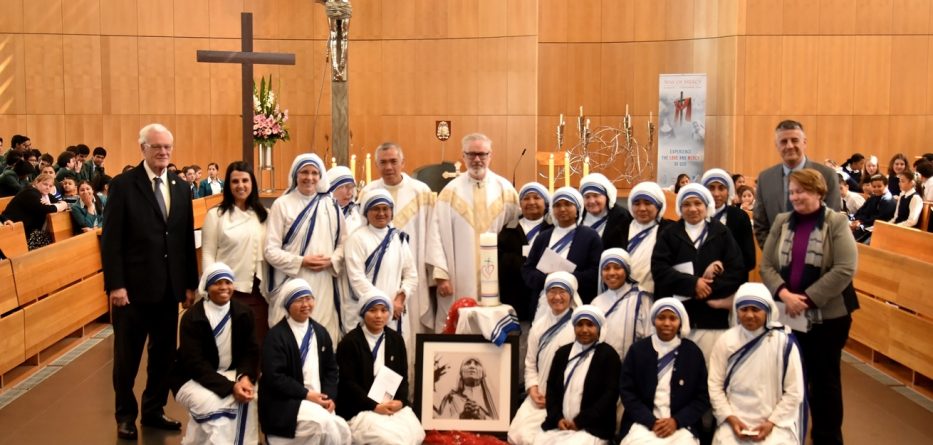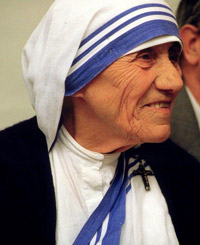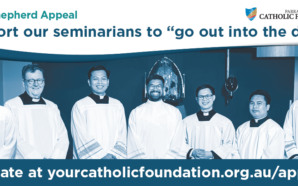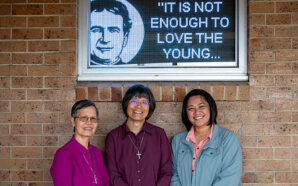By Ben Smith, Catholic Outlook, October 2016
There was great joy in the world on 4 September 2016 when Mother Teresa of Kolkata was proclaimed a saint. She is a glowing example of charity, inspiring not just Catholics, but people all over the world.
But for some she is a fraud and an ideological fanatic.
How is it possible for these two contradictory views to exist? Could it be due to Mother Teresa’s outspoken approach on a number of moral issues?
In her Nobel Peace Prize acceptance speech on 11 December 1979, she said that “the greatest destroyer of peace today is abortion.” This is because “if a mother can kill her own child – what is left for me to kill you and you to kill me – there is nothing between.”
In 1982, she spoke to students at a number of US universities, including Harvard, about the importance of the virtue of chastity. These were challenging words for her audiences and they remain a challenge to us in our time.
One of Mother Teresa’s most vocal critics was British journalist Christopher Hitchens, considered the founder of the New Atheism movement. He viewed the concept of a god as a totalitarian belief that restricts human freedom.
Around the time of Mother Teresa’s canonisation, many of his disciples emerged on social media to reiterate his ideas.
One of the charges he made against her was that: “She spent her life opposing the only known cure for poverty, which is the empowerment of women and the emancipation of them from a livestock version of compulsory reproduction.”
In terms of the empowerment of women, the order she founded, the Missionaries of Charity, run a number of schools, orphanages, health clinics, soup kitchens and family counselling programs. So this criticism is hard to justify.
However, Mother Teresa’s forthright views on abortion and sexual morality conflict with Hitchens’ charge concerning “reproductive emancipation”.
Her response to abortion was to set up adoption agencies to help find homes for unwanted children with those who had trouble conceiving children.
Her order taught natural family planning (NFP) to the poor of Kolkata. In her Nobel Prize speech, she recounted that the response she received from the poor who used NFP was: “Our family is healthy, our family is united, and we can have a baby whenever we want.”
These approaches respect the human dignity of all, including the unborn, and they also respect the dignity of the generative dimension of marriage by the promotion of responsible parenthood.
They go against the conventional wisdom that often ties foreign aid to population control programs for the developing world. The fertility of poor women in the developing world is seen as a problem that needs to be cured by programs that often involve levels of coercion to encourage abortion, contraception and/or sterilisation. China’s one-child policy is an example.
There are other criticisms of Mother Teresa’s work that I have not addressed here, but they generally involve judging with a secular Western world view the work of an organisation with a Catholic world view operating in extreme conditions in developing countries.
Members of her order do amazing work, to the best of their ability and with scarce resources to help people who no one else will help. It is easy to criticise from the comfort of an air-conditioned apartment, but it is harder to solve the complex challenge of poverty.
Mother Teresa’s canonisation was a wonderful occasion for the Church and the world. Her example will inspire people in both the present and the future, but these efforts will need to contend with various opposing world views that are becoming increasingly vocal and intolerant.
Ben Smith is Director of the Life, Marriage & Family Office in the Diocese of Parramatta: lmf@parra.catholic.org.au
Diocesan Family Sunday on 23 October 2016
Theme: ‘Family – An Oasis of Mercy’. An afternoon family gathering with Bishop Vincent Long OFM Conv and St Teresa of Kolkata’s Missionaries of Charity. From 2pm-5pm at the Shrine of the Holy Innocents, 8 Greyfriar Place, Kellyville. Be part of the Way of Mercy with the Mercy Cross and relics of St Mary of the Cross MacKillop and St Teresa of Kolkata. Hosted by the Life, Marriage & Family Office, Parramatta. Family Sunday will be celebrated at Masses throughout the Diocese of Parramatta. Inquiries tel (02) 8838 3441, lmf@parra.catholic.org.au
Couple Evening on 28 October 2016
Everyone is warmly invited to attend the Life, Marriage & Family Office Marriage Enrichment evening entitled ‘Communication 101’. This DVD presentation features Dr Gary Chapman, the well-known author of the Five Love Languages. This event is free and a light supper will be served. Starts 7.30pm in St Paul the Apostle Parish Hall, 40 Buckleys Rd, Winston Hills. RSVP to Life, Marriage & Family Office: tel (02) 8838 3460, LKeane@parra.catholic.org.au









